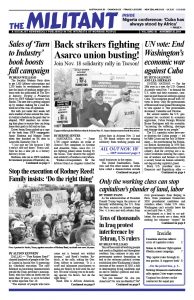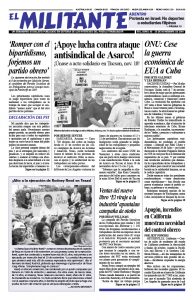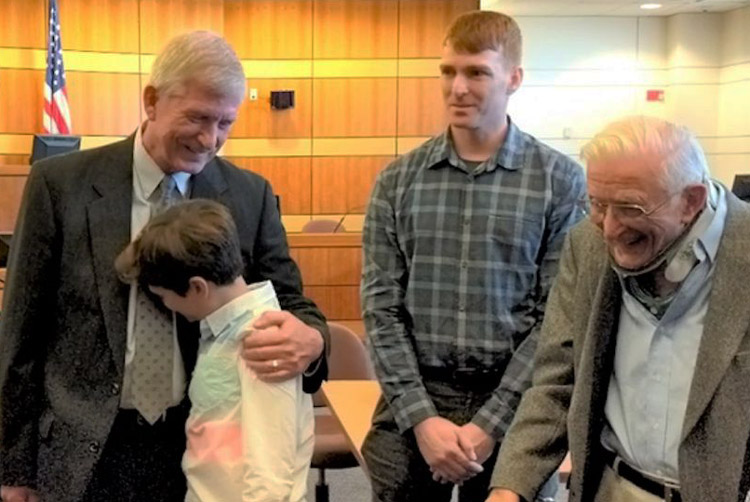The stakes are growing for the political rights of the working class in the landmark Ohio court battle won June 7 by the Gibsons, the family owners of a local bakery, against a malicious smear campaign by senior Oberlin College officials accusing them of racism and attempting to drive them out of business.
The institution’s course to defend its race-baiting slanders — and meritocratic class disdain for working people — by appealing the multimillion dollar award on bogus grounds of “free speech” has been reinforced by a new lawsuit launched against the Gibsons Oct. 31 by some local media bosses.
The group, which includes some Cleveland news outlets who haven’t previously shown much interest in covering the fight, is now backing the college’s efforts to smear the Gibsons under the guise of “freedom of the press.” Their legal moves now are an exact copy of moves by the college that were rejected by the trial judge. They seek to unseal Facebook records of a Gibson family member who wasn’t directly involved in the lawsuit or trial. Oberlin’s earlier effort to unseal the Facebook records was rejected because the school never argued they were pertinent to their case at the trial.
The college recently hired an additional phalanx of high-priced lawyers in an effort to overturn the unanimous Lorain County jury finding college officials guilty of slander and awarding $31.5 million in damages and legal fees to the Gibsons.
Oberlin College’s campaign against the Gibson family and their court victory took a hit Nov. 3 when the national CBS “Sunday Morning” show ran a 13-minute program on the dispute. The feature allows both college administrators and the Gibsons to explain how they see the case, but it clearly shines a critical light on Oberlin’s dishonesty about its slander campaign.
In an interview with well-known TV journalist Ted Koppel, college President Carmen Twillie Ambar had to acknowledge the jury’s findings, but claimed that one could have different “perceptions” of “disparate treatment with respect to people of color in the store.”
But neither Ambar’s interview nor any court testimony raised a single objective fact of any actual discrimination by the Gibsons. The college didn’t present a single area resident at trial to back up its slanders. In fact, testimony and evidence at trial confirmed the exact opposite.
Koppel interviewed Nathan Carpenter, editor-in-chief of the Oberlin Review, the student paper, which often echoes the administration’s line of disdain for the Gibsons. Carpenter claims the issue is students’ free speech, their “right to say what they said during the initial protests and whether the college is on the hook [for that].”
The college administration‘s appeal, filed Oct. 8, makes the same argument, insisting the jury’s decision jeopardized First Amendment rights to free speech by students.
But the Gibsons didn’t sue any students. They sued the college and some of its officials for their actions to try and smear and crush the family and their store.
The “Sunday Morning” report makes it clear it was only “when the college refused to issue a statement exonerating the family of racism [that] the Gibsons filed a lawsuit.”
And, as the CBS clip notes, “Freedom of speech does not grant a license to libel.” But it equivocates, saying “there are real concerns that the size of this award — $31.5 million — could undermine genuine freedom of speech on college campuses.”
David Gibson, the store owner, was asked by Koppel, “You had been branded as racists and you felt that was unjust, unfair, untrue?”
“Absolutely,” Gibson responds. “What you have in life is your reputation. It had taken generations to build this reputation for us.”
The Gibsons family bakery had provisioned the college for over a century. The trial revealed the college had never before made any complaint of racism against the store owners.
Koppel asks Ambar, “You’re a very distinguished academic. What is your reputation worth?” to which she replies: “My reputation is important.”
He then asks, “If your reputation was destroyed overnight, you could hardly put a price on that, could you?” Ambar tries to change the subject, saying “we” — the officials of the well-endowed liberal institution — believe the jury “determination was excessive.” Elsewhere, college officials have shown their true colors, saying this was due to “prejudices” by local working-class jury members.
The fact is Oberlin is a company town, where everyone is expected to do the bidding of the campus administration. They are currently on a campaign to cut the number of campus workers — members of United Auto Workers Local 2192 — and take other steps against their wages and working conditions.
The slander campaign by Oberlin College, one of the most expensive campuses in the country, began with a shoplifting incident at the Gibson’s store in November 2016.
An Oberlin student, who is Black, failed in an effort to use fake ID to buy wine, then stole two bottles. He and two friends attacked store clerk Allyn Gibson Jr., who had tried to stop him. Nine months later, the three pled guilty to attempted theft, stating no racism was involved in the affair.
An article in the Grape, Oberlin’s student life magazine, said students regularly shoplifted from stores in the towns, including Gibson’s. They didn’t do this because they needed to, the paper’s editor wrote, but because they “felt like it.”
For the two days after the arrest, the CBS clip shows, college officials helped organize students to protest at the bakery and “put out and distribute a defamatory flyer which described Gibson’s Bakery as ‘a racist establishment with a long account of racial profiling and discrimination.’”
College administrators cancelled their contracts with Gibson’s bakery. And when some faculty members questioned and objected to these actions, the officials’ response was “f–k em.”
Lawyers for the Gibsons family have filed a cross-appeal against the college, to restore the original $44 million jury verdict against it. This was reduced by the judge under an Ohio law that limits punitive damage awards. Similar laws challenged in 13 other states in recent years have been declared unconstitutional.
The CBS program can be viewed at: https://www.cbsnews.com/news/oberlin-college-and-gibsons-bakery-a-protest-against-racism-and-a-31-5-million-dollar-defamation-award/.


